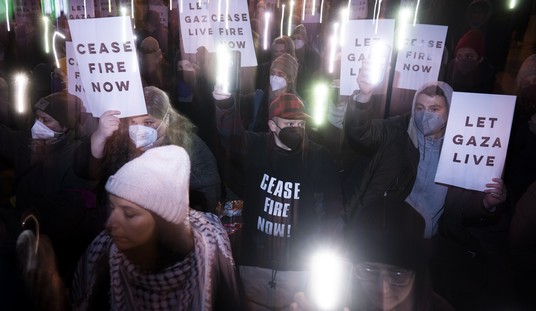Did we? I must have missed that in the media coverage of the 10th anniversary of the second invasion of Iraq, which provided the beginning of the end of a 12-year war with Saddam Hussein’s regime. Yesterday was the 10th anniversary of the fall of Hussein’s tyranny, when the dictator fled Baghdad for points unknown for another eight months, at which point American soldiers dragged him out of a spider hole. On that occasion, the new leader of Iraq reminds us that the US not only stopped the brutalization of 25 million people, we gained an important foreign-policy partner in southwest Asia:
Today, on the 10th anniversary of the overthrow of Saddam Hussein, the debate about whether it was worth it to topple the regime and the direction of the U.S.-Iraqi relationship is influenced by a pessimistic view that the United States has lost Iraq. Not true. Despite all the problems of the past decade, the overwhelming majority of Iraqis agree that we’re better off today than under Hussein’s brutal dictatorship.
Iraqis will remain grateful for the U.S. role and for the losses sustained by military and civilian personnel that contributed in ending Hussein’s rule. These losses pale by comparison, of course, to those sustained by the Iraqi people. Our government emerges from this experience determined to ensure that these sacrifices contribute to a future of freedom and prosperity for our country. …
Our cooperation with the United States continues to bear fruit, and we hope to accelerate and energize it even more. While our journey from despotism to democracy has not been easy, the Arab Spring has shown that all countries going through such transitions face turmoil. The protests in several cities in Iraq reflect the fact that, while some sectarian elements call for violence, the majority of Iraqis want to express their demands through democratic means. With provincial elections this month and general elections next year, Iraqis can resolve their disagreements with ballots, not bullets.
Jeffrey Goldberg wrote much the same at Bloomberg yesterday. In all of the handwringing we saw in the American media last month, Goldberg points out that we didn’t hear much from the Iraqis:
One thing I’ve noticed over the past two weeks, however, is that Iraqis themselves haven’t often been asked about their opinion of the war. Iraq, after President George W. Bush failed to accomplish his mission, was a place of violence and chaos, but before the invasion, it was a charnel house. Saddam Hussein’s regime murdered as many as 1 million Iraqis in its years in absolute power. Many Americans forget this. Most Iraqis don’t.
The New Yorker’s Dexter Filkins, who wrote the best book on Iraq (“The Forever War”), recently recalled a visit, shortly after the invasion, to one of Saddam’s torture chambers, a place called Al Hakemiya. He met a man there who identified himself as Al-Musawi. The two visited a room where Al-Musawi’s “arms had been nearly torn from their sockets.” He had been hung from the ceiling and electrocuted.
“Today, in 2013 — a decade later — it’s not fashionable to suggest that the American invasion of Iraq served any useful purpose,” Filkins continued. “But what are we to make of Iraqis like Al-Musawi? Or of torture chambers like Al Hakemiya? Where do we place them in our memories? And, more important, how should they shape our judgment of the war we waged?”
His suggestion: “Ask the Iraqis — that is, if anyone, in this moment of American navel-gazing, can be bothered to do so.” …
The serial and tragic mistakes of the Bush administration, and the naivete of people like me, make questioning the value of the invasion necessary. I thought that Iraq, with competent American help, could make the transition to at least semi-democracy, even after suffering such physical and psychological damage during the bleak years of Saddam’s reign. But those who believe the invasion was an act of insanity — especially those who fashion themselves as advocates for human rights, dignity and liberation — should at least ask Saddam’s many victims for their opinion on the matter before rendering final judgment.
Speaking of asking the Iraqis, Maliki wondered in his essay why the US and Obama administration hasn’t bothered to ask them about the situation in Syria. The long border makes Iraq a player in whatever the US decides to do about Bashar al-Assad, whose Ba’athist past probably wins him no favor in a post-Hussein Iraq. However, Maliki says that there are worse outcomes than the continuation of the Assad regime, and wonders why the US can’t see that, emphasis mine:
In Syria, we can conceive of no scenario in which a military “victory” by either the government or the opposition can bring peace and stability. Only a negotiated solution can lead to such an outcome. Accordingly, we oppose all transfers of weapons, to both the government and the opposition, and we are working to ensure that our airspace and territory are not used for such transfers.
Further militarization of the conflict will only increase the suffering of civilians and strengthen radical groups, including our common enemy, al-Qaeda. We have been mystified by what appears to be the widespread belief in the United States that any outcome in Syria that removes President Bashar al-Assad from power will be better than the status quo. A Syria controlled in whole or part by al-Qaeda and its affiliates — an outcome that grows more likely by the day — would be more dangerous to both our countries than anything we’ve seen up to now. Americans should remember that an unintended consequence of arming insurgents in Afghanistan to fight the Soviets was turning the country over to the Taliban and al-Qaeda.
Why go back that far? What were the unintended consequences of decapitating the Qaddafi regime in Libya two years ago and arming the “militias” that everyone knew were Islamist terror networks? We now have a failed state and a wide swath of territory under the thumb of AQ affiliates, which nearly turned Mali into an AQ state over the last few months.
Maybe we should spend more time posing questions to the Iraqis.







Join the conversation as a VIP Member